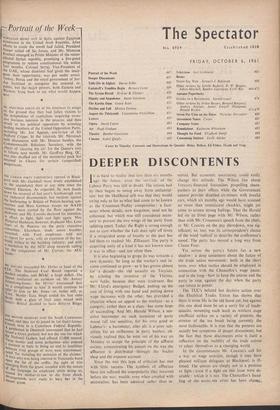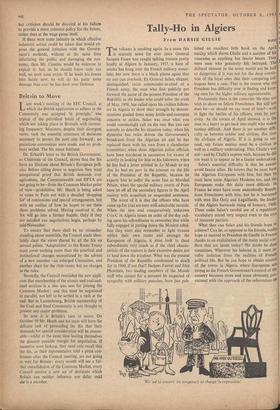DEEPER DISCONTENTS
IT is hard to realise that l:.ss than six months ago the future, even the survival, of the Labour Party was still in doubt. The unions had by then begun to swing away from unilateral- ism; but the likelihood still was that they would swing only as far as what had come to be known as the Crossman/Padley compromise:. a face- saver whose details; now forgotten, need not be exhumed, but which was still considered neces- sary to prevent the two wings of the party from splitting apart. Today, the Right is strong enough not to care whether the Left does split off (even if a misguided sense of loyalty to the past has led them to readmit Mr, Zilliacus). The party is acquiring unity Of a kind it has not known since it was in office—and not often then.
It is also beginning to grope its way towards a new dynamic. So long as the worker's real in- come continued to grow—as it has grown almost for a decade—the old 'assaults on Toryism, by echoing the .invective of the Thirties, were futile, because they were irrelevant. But Mr. Lloyd's emergency Budget, putting up the cost of living with one hand and putting down wage increases with the other, has provided a situation where an appeal to the workers—as • a category, rather than as a claSs—has some hope of succeeding. And Mr. Harold Wilson, a sen- sitive barometer on such occasions of party mood (all too sensitive, for his own good or Labour's: a barometer, after all, is a poor sub- stitute for an oriflamme in party battles). ob- viously realised this; he went out of his way on Monday to accept the principle of the affluent society, concentrating his assault on the way the affluence is distributed—through the bucket shop and the expense account.
Since the war this type of criticism has met with little success.• The symbols of affluence have not suffered the unpopularity they incurred before the war; wealth, even when coupled with ostentation, has been admired rather than re- sented. But economic uncertainty could easily, change this attitude. The Wilson line about Treasury-financed limousines propelling share- pushers to their offices while the Government cannot provide disabled ex-miners with invalid cars, which six months ago would have aroused no more than reminiscent chuckles, might yet come to arouse strong feelings. That the Herald led on its front page with Mr. Wilson, rather than with Mr. Crossman's speech from the chair, or Mr. Cousins on the pay showdown, was sig- nificant; so, too, was its correspondent's choice of the word `radical' to describe the conference's mood. The party has moved a long way from Clause Four.
Yet across the party's future lies a new shadow: a deep uneasiness about the future of the trade union movement: both in the short term, over what tactics should be employed in connection with the Chancellor's wage pause; and in the long—how to keep the unions and the party in step, against the day when the party can return to power.
The TUC's belated but decisive action over the Electrical Trades Union has shown that there is some life in the old horse yet; but against this one deed must be set a sorry list of inade- quacies, mounting each week as workers stage unofficial strikes on a variety of pretexts, the erosion of the tea break being currently the most fashionable. It is true that the pretexts are usually but symptoms of deeper discontents; but the fact that those discontents exist is itself a reflection on the inability of the trade unions to adapt themselves to a changing, world.
In the circumstances Mr. Cousins's call for a war on wage restraint, though it may have pleased militant delegates at Blackpool, is ill- timed. The unions are simply not in a position to fight---even if a fight on this issue were de- sirable: which it is not. The Chancellor's hand- ling of the econo Inc crisis has been clumsy, but criticism should be directed at his failure to provide a more coherent policy for the future, rather than at the wage pause itself.
If there were some industry in which effective industrial action could be taken that would ex- press the general irritation with the Govern- ment's methods, without at the same time infuriating the public and damaging the eco- nomy, then Mr. Cousins would be welcome to exploit it; but, as he should know only too well, no such issue exists. If he leads his forces into battle now, he will do his party more damage than ever he has done over Defence.















































 Previous page
Previous page